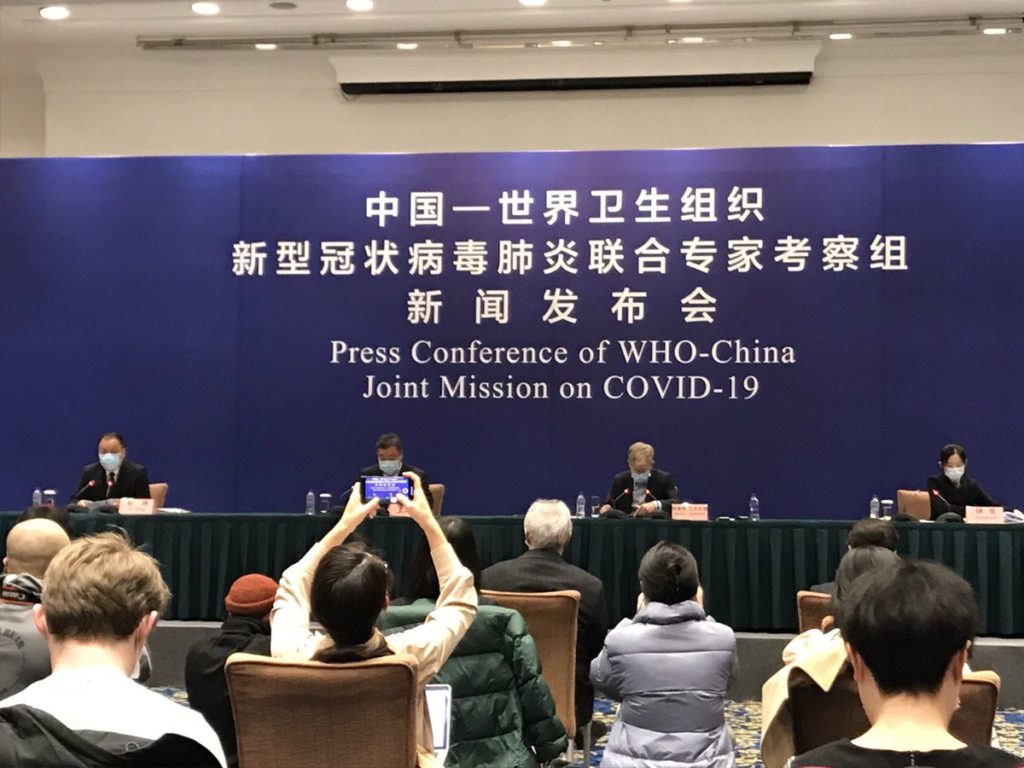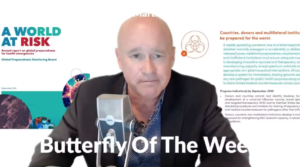【速報】武漢で調査を行なったWHOチームが記者会見:新型コロナウィルスのゲノムに「大きな変異は起きていない」しかし「これはSARSでもなくインフルエンザでもない」

Photo via Twitter
CNBCのユニス・ユーン記者が、中国入りし現地調査を行ったWHOチームによる記者会見の内容をライブでツイート発信している。(しかし、この記者会見でもWHOの代表者は歯の浮くような中国大絶賛を繰り返しており異様である。)
Team @WHO, #China started trip Feb 16 and visited Beijing, Guangdong, Sichuan, Wuhan. National Health Commission’s Dr. Liang Wannian, WHO’s Bruce Aylward present. #coronavirus
— Eunice Yoon (@onlyyoontv) February 24, 2020
【訳】中国入りしたWHOチームは2月16日に訪中を開始。北京、広州、四川、武漢を訪問した。中国国家衛生健康委員会調査チーム長のリアン・ワンイアン(梁万年)博士とWHOのブルース・エールワード氏がプレゼンを行う。
Outside Wuhan/Hubei, early cases are mostly related to Wuhan/Hubei, in some places family clusters, community clusters are seen. Epidemics in these areas are different from Wuhan. In special locations, epidemics broke out, i.e. among hospital medical staff over 3000. But whether
— Eunice Yoon (@onlyyoontv) February 24, 2020
【訳】湖北省/武漢の外では、初期の感染ケースはほとんどが湖北省/武漢に関係している。ある地域では、家族単位のクラスター、コミュニティー単位のクラスターが見られる。これら地域での蔓延は、武漢とは異なっている。特別な地域では、感染の蔓延が突然発生した。それはつまり、3000人以上の病院の医療関係者の間で突然発生した。しかしその起源がコミュニティーなのか病院なのかは未だ判別されていない。感染したその3000人はほとんどか武漢出身である。感染のピーク時には、我々の医療スタッフはこのウィルスについて十分な理解をしておらず、物資が不足し、長時間労働で十分な休憩がなかった可能性がある。
Dr. Liang: 25 experts. Spoke with officials, scientists, residents, medical workers. Our main goals: to understand 1) characteristics of epidemic 2) clinical symptoms incl. mild/middle/critical 3) prevention/control measures and effectiveness 4) suggestions for future research
— Eunice Yoon (@onlyyoontv) February 24, 2020
【訳】リアン博士:25人の専門家。政府関係者、科学者、住人、医療従事者と話をした。我々の主な目的:1)感染の特徴、2)軽度/中程度/深刻な症状を含む臨床症状、3)防御/制御対策および効果、4)将来の研究への提言について理解すること
5 major findings: 1) understanding of virus. Experts studied 104 strains from different places and found they were 99.9% similar in origin. So experts believe there is no significant mutation. Ave age 51. 80% of patients 30-65. In confirmed cases, 78% from Hubei as of Feb 22…
— Eunice Yoon (@onlyyoontv) February 24, 2020
【訳】5つの主要な発見事項:1)ウィルスに関する理解。専門家たちは異なる場所から104種類のウィルス株を調査し、99.9%はその起源が類似していることを発見した。そのため、専門家たちは大きな変異が起きていないと確信している。平均年齢51歳。80%の患者は30歳〜65歳。2月22日時点で確認されているケースでは、78%が湖北省出身。
On severity: most patients are mild cases. 80% are mild. 13.8% severe. 6.1% critical. Death rate 3-4% nationally. Outside Wuhan: 0.7%. From symptoms to confirmed, lowered from 12 days in early Jan to 3 days now. For Wuhan, 5 to 15 days. Evidence diagnosis ability has improved…
— Eunice Yoon (@onlyyoontv) February 24, 2020
【訳】深刻度について:ほとんどの患者は軽度である。80%は中程度。13.8%が深刻。6.1%が重篤。致死率は国内全土で3-4%。武漢以外:0.7%。症状(発症)から確認されるまで、1月初旬の12日から、現在は3日に低下。武漢では5日から15日。診断能力が改善している証拠・・・
Average recovery time: 2 weeks for mild cases from onset to recovered. 3-6 weeks for severe…
— Eunice Yoon (@onlyyoontv) February 24, 2020
【訳】回復までの平均時間:軽度のケースでは発病から回復まで2週間。深刻なケースでは3〜6週間・・・
WHO’s Aylward: praises China and ambitious, aggressive approach. First old fashioned measures like hand-washing, wearing masks, keep distance then response moved to scientific, risk-oriented action. Turbo charged w/ modern tech. More efficient than could have imagined years ago.
— Eunice Yoon (@onlyyoontv) February 24, 2020
【訳】WHOエールワード氏:中国とその意欲的で積極的なアプローチを称賛。昔からの手洗い、マスク着用、(人から)距離をとることといった方策が最初。それから、対応は科学的でリスク重視のアクションに移行。近代的技術でターボチャージされている。何年も前には想像できなかったくらいより効率化されている。
How they made this response switch. From the tremendous will of Chinese people, workers, government officials. No question that China’s approach has definitely helped prevent the fast spreading epidemic…
— Eunice Yoon (@onlyyoontv) February 24, 2020
【訳】彼らがこの対応の転換をどのように行ったのか。中国の人々、作業する人々、政府当局者たちの偉大な意思によって。中国のアプローチが明らかに流行の迅速な拡大スピードを防ぐことに寄与したのは間違いない・・・
Realizes there are challenges the counting method of the numbers. But looking at different sources, the decline in numbers is real. Much evidence to support that.
— Eunice Yoon (@onlyyoontv) February 24, 2020
【訳】(感染者)数のカウント方法に困難があることに気がついている。しかし異なる複数の情報源を見てみると、数が減少していることは本当である。それを示す多くの証拠がある。
In Wuhan, hospital beds are more available. They can move more people in. This is a strong indicator. One researcher also said biggest challenge for developing an anti-viral trial is to find cases because of the drop in patients.
— Eunice Yoon (@onlyyoontv) February 24, 2020
【訳】武漢では、より多くの病床数が利用可能である。彼らはより多くの人々を入院させることができる。これは力強い指標である。1人の研究者は、抗ウィルス(薬)の試験を行うことが直面する最大の難関は、(試験のための)感染者を見つけることであると語った。なぜなら患者数が減少しているためである。
Showing graphs on outbreaks. Says hundreds of thousands of Chinese have benefited from China’s tremendous effort. China’s very aggressive measures have changed the curve of the epidemic.
— Eunice Yoon (@onlyyoontv) February 24, 2020
【訳】感染拡大のグラフを示し、何億人にものぼる中国人が中国による素晴らしい努力のおかげで恩恵を受けていると語る。中国による非常に積極的な対策により、感染拡大の曲線が変わっている。
Those are the good things but we also saw problems. We always learn lessons with every outbreak on response time, communication, protection for medical staff, action.
— Eunice Yoon (@onlyyoontv) February 24, 2020
【訳】これらは良いことであるが、我々は問題についても観察している。感染爆発が起きる時、我々はいつも反応時間、コミュニケーション、医療スタッフの防護、アクションについて教訓を学ぶ。
China wants to resume work, reopen schools. China wants to get back to normal. This should happen. But says this virus will probably be around “for months”. So the key will be to phase lifting of different measures. Should also bolster what they have now because cases could..
— Eunice Yoon (@onlyyoontv) February 24, 2020
【訳】中国は仕事を再開し、学校をふたたび開きたいと考えている。中国は通常に戻りたいと考えている。これは(いつかは)起きることが見込まれている。しかし、このウィルスはおそらく「何ヶ月間も(for months)」市中にとどまるだろうと語った。そのため、鍵となるのは、それぞれ異なる対策について、その解除を段階的に行うことことになるだろうということ。彼らが現在行っていることを下支えするべきである。なぜなら感染者数は・・・
..rise again as China gets back to normal. Most important recommendation: the world needs the experience of China to cope with epidemic and the only country to turn around such a big outbreak.
— Eunice Yoon (@onlyyoontv) February 24, 2020
【訳】中国が平常に戻るにつれて、再び増加する可能性があるためである。最も重要な提言:世界は、感染拡大に対処するために、中国が体験したことを必要としている。中国はこのような大規模の感染爆発から回復している唯一の国である。
In terms of travel and trade, any country taking measures outside WHO’s recommendation should reevaluate since risk from China is dropping. What China has to add is rising.
— Eunice Yoon (@onlyyoontv) February 24, 2020
【訳】渡航と貿易に関して、WHOの勧告を超えて対策をとっている国は、中国からのリスクは減少しているため、検討し直すべきである。中国が加えなければいけないことは増えている。
WHO on the global situation: the virus is new but its capable of causing great impact on public health, the economy, and society. It is not SARS, not the flu. If we don’t treat it as a virus with its own characteristics, we won’t be able to fight it.
— Eunice Yoon (@onlyyoontv) February 24, 2020
【訳】世界の状況についてWHOの見解:このウィルスは新しく、公衆衛生、経済、そして社会に多大な影響を及ぼす能力がある。これはSARSでもなくインフルエンザでもない。我々は、これを独特な特徴を持ったウィルスであると扱わなければ、これと戦うことはできないだろう。
Second finding for global impact, the fundamentals of Hubei, Guangdong, can be applied elsewhere. This is a dangerous virus and we have to work with experience we have. And this country has demonstrated its measures can work.
— Eunice Yoon (@onlyyoontv) February 24, 2020
【訳】世界への影響について2つ目の発見は、湖北省、広東省の基本事項がその他どの地域にも応用することができるということである。これは危険なウィルスであり、我々が持っている経験を利用して対処しなければいけない。そしてこの国は、その対策が効果を発揮できているということを実証している。
Third finding, global community is not ready with mindset or material to act in this same way. The Chinese adapt.
— Eunice Yoon (@onlyyoontv) February 24, 2020
【訳】3つ目の発見は、世界のコミュニティーでは、これ(中国)と同じようなマインドセットや、行動するための物資を準備できていない。
WHO: China was the first line of defense to prevent the spread of this virus. They feared they had the responsibility to protect the world from this. They locked down cities of 15mln people to prevent the spread…
— Eunice Yoon (@onlyyoontv) February 24, 2020
【訳】WHO:中国は、このウィルスの拡散を防ぐための第一線の防御ラインであった。彼らは、これから世界を守るために責任があると恐れていた。彼らは拡散を防ぐために1500万人にのぼる複数の都市を封鎖した・・・
As they dropped the force of infection, that has dropped spread without a doubt. Other countries should consider similar action to be a second line of defense to prevent spread to low income countries with lower ability to fight it.
— Eunice Yoon (@onlyyoontv) February 24, 2020
【訳】感染力が低下するにつれて、間違いなく拡大も低下した。他の国々は、これと戦う能力が低い低所得の国々に拡散するのを防ぐために、第二線の防御ラインとなるために同様のアクションをとることを検討するべきである。
WHO: On drug, there is one that may be effective- remdesivir. @megtirrell
— Eunice Yoon (@onlyyoontv) February 24, 2020
【訳】WHO:薬に関して、一つ効果があるかもしれない薬がある。それはremdesivir @megtirrell
WHO: We have put in recommendations for the public. This cannot work without the collective will of the population working towards it. That is what distinguishes this country— using old fashion public health measures and moving to modern response to fend off epidemic.
— Eunice Yoon (@onlyyoontv) February 24, 2020
【訳】WHO:我々は一般に向けた提言を付け加えた。これ(ウィルス)に向かって対応する人々全体の総意なくして、これは効果を発揮することはできない。このことが、流行病と戦うために昔ながらの公衆衛生対策を利用し、そして近代的な対応に移行しているこの国を優れた存在にしている。
WHO on Italy: they are moving with aggressive measures. China has demonstrated this can work.
— Eunice Yoon (@onlyyoontv) February 24, 2020
【訳】イタリアについてWHOの発言:彼らはアグレッシブな対策をとっている。中国は、これが効果を発揮することを実証している。
BBC Q to WHO: You touched about the problems. To what extent did cover-up and censorship worsen the ability to face the epidemic?
— Eunice Yoon (@onlyyoontv) February 24, 2020
【訳】BBCからWHOへ質問:問題について言及されました。隠蔽と検閲は、どの程度この流行病に直面する能力を悪化させたでしょうか?
WHO: Our purpose was to find what works. Awareness is a common problem in many outbreaks. I don’t know about the factor you mentioned. We didn’t look at that factor. There were other factors we looked at as well…
— Eunice Yoon (@onlyyoontv) February 24, 2020
【訳】WHO:我々の目的は、何が効果を発揮するかということを発見することだった。多くの感染拡大においてよくある問題は、認識することだ。あなたが言及されたファクターについて私はわからない。我々はそのファクターについては調べていない。我々が調べた他のファクターはある・・・
The most important is speed. What worries me is have other countries learned lessons from China’s experience.
— Eunice Yoon (@onlyyoontv) February 24, 2020
【訳】最も重要なことはスピードだ。私が懸念するのは、中国の経験から他の国々へ教訓を学ばせること。
This is the WHO expert at the press briefing in Beijing. https://t.co/0HrZ9MVdai
— Eunice Yoon (@onlyyoontv) February 24, 2020
【訳】これは北京で記者会見を行っているWHO専門家。
本当に?
このように報道しておけば、あなたが中国から国外追放されることはないだろう。
WHO: There is one other point. President Xi himself said mistakes were made. We need to address. There is a recognition that the human cost is unacceptable. We all have to look at our systems because none of them as fast enough.
— Eunice Yoon (@onlyyoontv) February 24, 2020
【訳】WHO:もう一つポイントがある。習近平自身、様々な失敗を犯したと語っている。我々は(それらについて)取り組む必要がある。人的損失は受け入れがたいと認識されている。我々は全員、我々の制度を調べなければいけない。なぜなら、それらはどれも十分迅速なものではないからだ。
Dr. Liang responding to BBC: For Wuhan, looking back, what could have been the best measure taken? The feeling is if we use traditional understanding of the flu and SARS, it wouldn’t work- using our knowledge about other diseases…
— Eunice Yoon (@onlyyoontv) February 24, 2020
【訳】リアン博士によるBBCへの返事:武漢に関して、何が最善策だっただろうか?と振り返ってみた場合。私の印象では、インフルエンザやSARSに対する従来の理解、他の病気に関する我々の理解を用いていれば、それは効果を発揮しなかっただろう・・・
Dr. Liang continues to BBC: This virus is sneaky. We needed to fight while we learned, while we improved. This is what we lacked in the early stages.
— Eunice Yoon (@onlyyoontv) February 24, 2020
【訳】リアン博士によるBBCへの返事・続き:このウィルスは裏をかいてくる。我々は学びながら戦う必要があった。そして我々は改善した。これこそが、我々が初期段階で欠落していたことだ。
CCTV to WHO: What is the top recommendation for China’s next step efforts?
— Eunice Yoon (@onlyyoontv) February 24, 2020
【訳】CCTVからWHOへ:中国が次に行う対策で最重要の提言は何ですか?
WHO: The most important is not to be complacent. There are other places in the world where people are vulnerable. It will require rapid work. And sometimes when dealing with a virus, we become complacent. Hospital beds, vaccines. China is concerned and knows it faces this risk.
— Eunice Yoon (@onlyyoontv) February 24, 2020
【訳】最も重要なことは自己満足に陥らないことだ。世界の他の地域には脆弱な人々がいる。迅速な作業が必要になっている。そしてウィルスに対処するとき、たまに我々は自己満足に陥る。病床、ワクチン。中国は今でもこのリスクを懸念し、それに直面していることを知っている。
Singapore media: What is the situation in Wuhan? When can we expect a turning point when life will return to normal?
— Eunice Yoon (@onlyyoontv) February 24, 2020
【訳】シンガポールのメディア:武漢での現在の状況は?生活が通常に戻るためのターニング・ポイントはいつになるでしょうか?
WHO: The turning point has occurred here (pointing to graph). Will they get to zero? Tricky. You’re looking at weeks to get it down.
— Eunice Yoon (@onlyyoontv) February 24, 2020
【訳】WHO:ターニング・ポイントはここで起きた(グラフを指差す)。彼ら(感染者数)はゼロになるだろうか?それは微妙だ。それが減少するまで何週間もかかるだろう。
WHO: the real thing to look at is the risk. The risk in Wuhan has gone way down. And that has completely changed. (Earlier said if we see newly confirmed cases dropping in the double digits in the next weeks, we will know this is getting better.)
— Eunice Yoon (@onlyyoontv) February 24, 2020
【訳】WHO:本当に注目しなければいけないのはリスクだ。武漢におけるリスクは、かなり低下している。それは完全に変わっている。(記者会見の始め、新たに感染が確認されたケースがこの先何週間かで二桁台の減少をすれば、状況は改善していると判明するだろうと語っていた。)
Dr. Liang to Singapore media: the situation in Wuhan is still severe. We are in a critical moment whether we can win this war. Severe and critical cases/confirmed cases, if they continue to drop, that would be good news..
— Eunice Yoon (@onlyyoontv) February 24, 2020
【訳】リアン博士からシンガポール・メディアへ:武漢での状況はいまだ深刻だ。我々がこの戦争に勝てるかどうか、我々は重要な瞬間にいる。深刻そして重篤なケース/確認されたケースが継続して減少すれば、それは良いニュースだ。
Dr. Liang continues to Singapore media: But we are still seeing 400+ new confirmed cases and 400-500 new suspected cases. We have a basic judgment: the outbreak in the early stage has been contained.
— Eunice Yoon (@onlyyoontv) February 24, 2020
【訳】リアン博士からシンガポール・メディアへ・続き:しかし我々は400人以上の新規感染者を確認しており、400〜500人の新たに感染が疑われるケースが見つかっている。我々は次の基本的判断を下している:初期の感染急増(アウトブレーク)は収束した。
Sky News: you mentioned skepticism with the numbers. Why weren’t WHO officials allowed in earlier?
— Eunice Yoon (@onlyyoontv) February 24, 2020
【訳】Sky News:数について疑っていると言及されました。なぜWHOの人間がもっと早く許可されなかったのでしょうか?
WHO: We have had a team here and one in Wuhan Jan 21-22 and WHO has never left. In terms of this team, we have had international experts, and it is difficult to pull together a team.
— Eunice Yoon (@onlyyoontv) February 24, 2020
【訳】 WHO:我々は、ここ(北京)に1チーム、そして1月21日〜22日には武漢に1チームを派遣している。WHOは(それ以来中国を)一度も離れていない。このチームに関して、我々は国際的専門家の集まりだ。チームを集めることは難しいことだ。
Dr. Liang continues: Most patients have only mild symptoms in the beginning. Some experience a sudden change in one week. The virus is fatal to elderly patients with other diseases. So far we don’t have an effective way to detect and protect easily infected groups…
— Eunice Yoon (@onlyyoontv) February 24, 2020
【訳】 リアン博士・続き:ほとんどの患者は、初期段階では軽度の症状しかない。そのうちの何人かは、1週目で突然症状が変化する。このウィルスは他の持病がある高齢者にとっては命に関わる。これまでのところ、感染した集団を容易に特定し保護する効果的な方法を見出していない・・・
Dr. Liang continues: It is indeed the most difficult epidemic we have had to try to prevent and control since modern China was established.
— Eunice Yoon (@onlyyoontv) February 24, 2020
【訳】 リアン博士・続き:近代中国が建国されて以来、これは確かに我々が試みてきた中で防御と制御を行うことが最も困難な流行病だ。
CNN: You said the Chinese way is the best strategy. But this is a country with one party government – is this feasible in other places?
— Eunice Yoon (@onlyyoontv) February 24, 2020
【訳】CNN:中国のとった方法が最善の戦略だとおっしゃいました。しかしこの国は一党(独裁)政府です。他の場所でも実行可能でしょうか?
WHO: What we see in Wuhan, Hubei, are measures like looking for close contacts, quarantine, pushing health promotion, then you get to suspending public gatherings, closing schools. Then use modern tech…
— Eunice Yoon (@onlyyoontv) February 24, 2020
【訳】WHO:湖北省武漢で我々が目撃したのは、濃厚接触、隔離、衛生向上のプロモーションを期待する対策であり、それから公共での集会の禁止、学校閉鎖だ。そして近代的な技術の利用・・・
WHO to CNN: The big message is you can control this virus by using these measures. You don’t have to lock down cities when we don’t need to. I know this requires strong leadership and a focused public will but the public will can be focused when facing an epidemic.
— Eunice Yoon (@onlyyoontv) February 24, 2020
【訳】WHOからCNNへ:大きなメッセージは、こうした方策を用いることでこのウィルスを制御することができるということだ。そうする必要がない場合は、都市を閉鎖する必要はない。これには強力なリーダーシップが必要とされることは知っている。しかし流行病の蔓延に直面する時、世間一般に注意を集中させることになる。
Press briefing ended. Now.. off to the @CNBC bureau! pic.twitter.com/ebhRjG0jpT
— Eunice Yoon (@onlyyoontv) February 24, 2020
【訳】記者会見終了。
* * *
このWHOが北京で開いた記者会見は、中国政府とその対応を称賛するプロパガンダのようだという批判があがっている。世界の研究者たちは、このウィルスがすでに変異している証拠があると警鐘を鳴らしており、本日WHOが発表した内容はそれと矛盾している。
【追加情報1】WHOの記者会見が終わった数時間後、ニューヨークの株式市場では指標がのきなみ大幅下落して取引が始まっている。Nasdaqは3.3%以上の下落、DowとS&P500も3%前後の大幅下落となっている。WHOが発表した内容を市場は信じていないことが判明している。
【追加情報2】スイス・ジュネーブのWHO本部で、月曜朝、記者会見を開いたテドロス事務局長は、新型コロナウィルスの感染拡大は真の「パンデミック」ではないと語った。その理由は、世界的に「大規模な死者数」がまだ発生していないため。
記者会見の動画はここで視聴できる:
BonaFidrをフォロー





